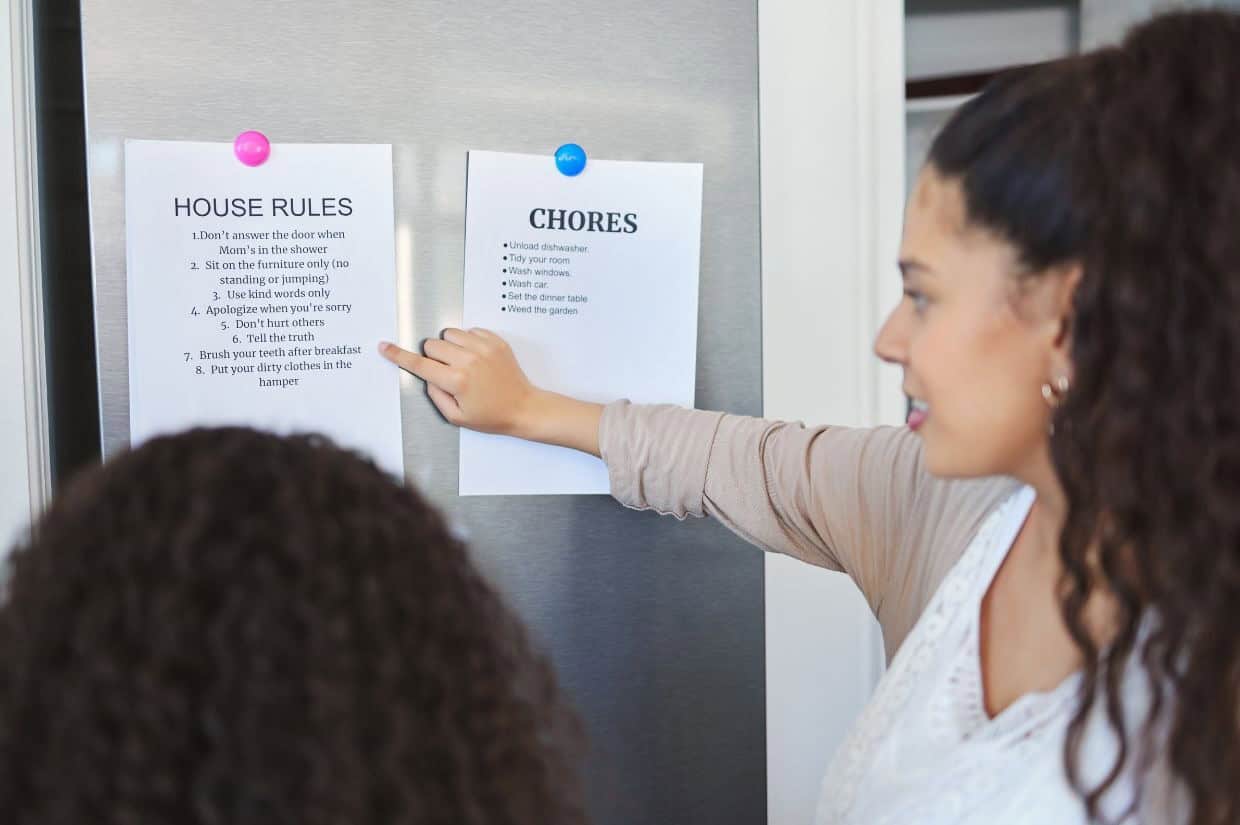Setting boundaries for kids is an essential step in creating a structured and nurturing home environment. Household rules help kids understand what is expected of them, promoting a sense of security and responsibility. Let’s look at some of those rules that help guide kids toward positive behavior while still allowing room for growth and self-expression.

Why are household rules important?
Clear household rules create a foundation of respect, responsibility and consistency. Kids thrive when they know the boundaries they are expected to operate within. It encourages self-discipline, teaches accountability and helps foster better communication between parents and kids. Most importantly, establishing rules early on makes it easier for kids to understand the consequences of their actions and how to make better choices in the future. Here are seven key household rules to help create a structured, supportive environment for your children’s growth and development.
Establish a set bedtime
Setting a regular bedtime ensures that kids get enough rest, which is critical for their development and health. Lack of sleep can lead to issues with mood, concentration and overall behavior. By enforcing a consistent bedtime, kids develop good sleep habits that benefit them both physically and emotionally. Additionally, a set bedtime routine can provide children with a sense of security and stability, helping them wind down and mentally prepare for the next day.
Limit screen time
In today’s digital world, it’s important to monitor and limit screen time. Excessive use of electronics can interfere with physical activity, disrupt sleep and affect academic performance. By setting specific hours for TV, video games and other digital activities, kids can learn to balance entertainment with other important aspects of their lives, such as family time and outdoor play.
“In our house, we have a few simple rules to keep things running smoothly. No phones at the dinner table — it’s family time. Everyone’s bed is made every morning to start the day off right, and chores are done each day to keep everything tidy. If the rules aren’t followed, there’s a consequence. For each reminder, extra chores will be added, like sweeping or folding laundry; It’s a way to help everyone stay accountable and keep the house running smoothly.”
— Jere’ Cassidy, One Hot Oven

Complete chores before playtime
Assigning age-appropriate chores helps children learn responsibility and the importance of contributing to the household. A simple rule like chores before play instills discipline and teaches kids the value of hard work. This approach also shows them that they are part of a team, working together to maintain the home. Start giving your child little chores from toddler age and they’ll grow into real helpers who don’t shy away from doing work around the house.
Use polite language
Encouraging kids to use polite language such as please and thank you promotes respect for others and improves their social skills. Setting expectations for manners early on creates a positive communication environment both at home and in public. Politeness isn’t just about following rules; it shows empathy and thoughtfulness, qualities that will benefit children as they grow into more compassionate and considerate individuals. Over time, these habits become second nature, helping kids build better relationships and navigate social situations with confidence.
Be honest
Honesty is a cornerstone of trust within a family. Teaching kids the importance of being truthful helps build strong, open relationships. Encourage your children to always speak the truth, even when it’s difficult. This rule teaches integrity and reinforces the idea that honesty leads to better understanding and stronger family bonds.
Treat others with respect
Respect for others is one of the most important values children can learn. This rule applies not only to family members but also to friends, teachers and even strangers. When children understand the importance of treating others with kindness and consideration, they are more likely to build positive relationships and avoid conflicts. Teach your kids that they can disagree with others but can’t be rude when expressing their disagreement.

Clean up after yourself
A simple yet effective household rule is encouraging children to clean up after themselves. Whether it’s toys, books or dishes, teaching children to tidy up after activities helps them take responsibility for their environment. This habit promotes a sense of order and contributes to a more organized and stress-free household.
Creating a positive environment with rules
While it’s essential to have rules in place, it’s also important to explain the reasons behind them. Children are more likely to follow rules when they understand their purpose. Engage them in discussions about why rules are necessary and how they benefit everyone in the family. Work with your partner to create a structure the whole family can get behind. Not doing so is one of the dangerous limiting beliefs destroying your relationship with your partner and children. By creating a positive atmosphere around household rules, you’ll encourage your kids to follow them willingly and enthusiastically.
One last thing
Establishing household rules is one of the most effective ways to set clear expectations for kids. These guidelines help create a structured environment where children can thrive, develop essential life skills and build strong relationships. With consistent enforcement and open communication, household rules can guide children towards becoming responsible and respectful individuals.
Tamara Tsaturyan is the owner and writer of Thriving In Parenting. It’s a website focused on providing simple tips for busy parents — easy and healthy recipes, home decor and organization ideas and all things parenting.